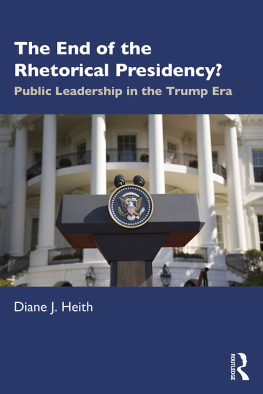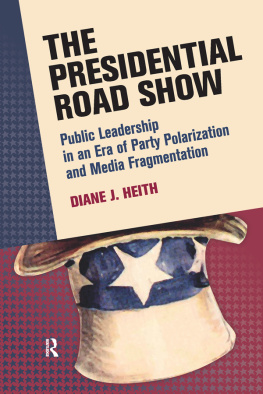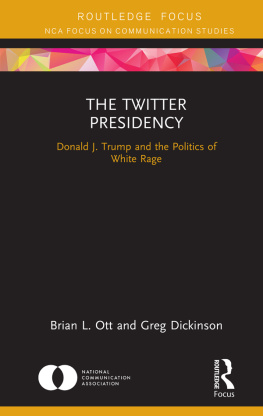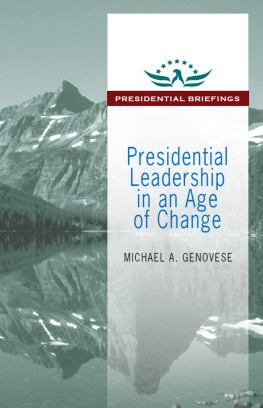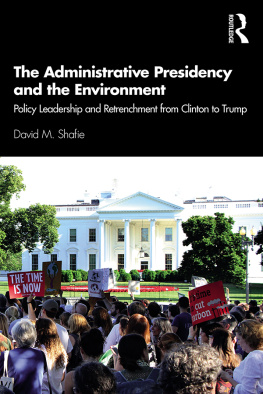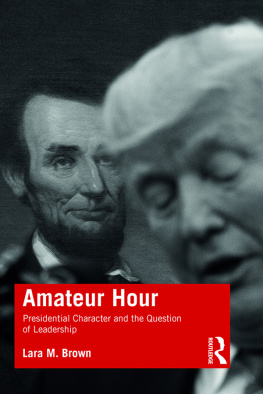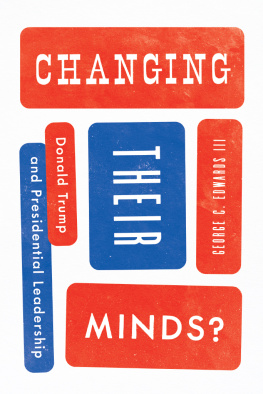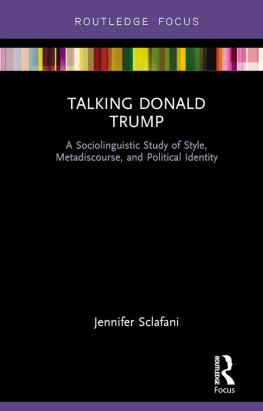In The End of the Rhetorical Presidency, Diane Heith has written a well-crafted and entirely readable discussion of the Trump presidency as understood through his efforts at rhetorical leadership. It is useful for anyone interested in understanding Donald Trumps relationship to the history and practices of presidential rhetoric. Heith notes that much of what Trump has done and is doing as president is consistent with broad patterns of that leadership, but also finds that his presidency reveals an important struggle between the hyper-individualized and importantly institutional valences of the office. Trumps tendency to favor individual over institutional aspects has damaged his ability to govern even while concentrating attention on his rhetorical style.
Mary E. Stuckey, Pennsylvania State University
Diane Heiths new study of presidential communication examines how and why President Trump has barreled through one executive branch norm after another on his way to dominating Washington policy-making and the never-ending news cycle. This vital work, sure to be a winner with students and scholars, offers an effective and accessible analysis of White House self-marketing during a roller-coaster presidency like no other.
Stephen Farnsworth, University of Mary Washington
Donald Trump has forever altered the rhetorical presidency and Diane Heiths absorbing work demonstrates exactly how he did so. Anyone interested in the narrowing of the public presidency because of the splintering of partisans and the future of presidential communication will want to read this topical book.
Brandon Rottinghaus, University of Houston
For those struggling with whether Trump is an anomaly or a glimpse of things to come for the institution of the presidency, Diane Heith offers important and much-needed insight. She captures the struggle within the Trump presidency between the institutional and the individual, and shows how the individual is winning. Students of the presidency will benefit enormously from Heiths situating Trumps rhetoric in the larger context of recent presidents, clearly showing where Trump is well within institutional structures, and where his devolved approach to rhetorical leadership is truly unprecedented.
Donna R. Hoffman, University of Northern Iowa
THE END OF THE RHETORICAL PRESIDENCY?
The End of the Rhetorical Presidency? Public Leadership in the Trump Era explores one of the most disruptive aspects of the Trump presidency.
Since the FDR administration, presidents developed the capacity and skill to use the public to influence the legislative arena, gain reelection, survive scandal and secure their legacy. Consequently, presidential rhetorical leadership has its own norms and expectations. Comparing President Trumps communications apparatus as well as rhetoric (including Twitter) to previous presidents, Diane Heith demonstrates how Trump exercises leadership by adhering to some of these norms and expectations, but rejects, abandons and undermines most. Heith argues that his individual, rather than institutional, approach to leadership represents a change in tone, language and style. She concludes that the loss of skill and capacity represents a devolution of the White House institution dedicated to public leadership, especially in the legislative arena. More significantly, the individual approach emphasizes weakening the ability of the press and other political elites to hold the president accountable.
This book will appeal to students and scholars of the presidency as well as general readers who quest for a deeper understanding of the Trump White House.
Diane J. Heith is Professor of Government and Politics at St. Johns University. She is the author of several works on the presidency, public opinion, campaigns and elections, and the media including, The Presidential Road Show: Public Leadership in an Era of Party Polarization and Media Fragmentation (2013), and Polling to Govern: Public Opinion and Presidential Leadership (2004). She is co-author of Presidents and the American Presidency (2018) and the 2016 Presidential Election Guide (2016) and co-editor of In the Public Domain: Presidents and the Challenges of Public Leadership (2005). Her work has appeared in The New York Times, Public Opinion Quarterly, Presidential Studies Quarterly, Political Science Quarterly, The Journal of Health Politics, Policy and Law, The Journal of Women, Politics and Policy, White House Studies and Congress and the Presidency.
THE END OF THE RHETORICAL PRESIDENCY?
Public Leadership in the Trump Era
Diane J. Heith
First published 2021
by Routledge
52 Vanderbilt Avenue, New York, NY 10017
and by Routledge
2 Park Square, Milton Park, Abingdon, Oxon, OX14 4RN
Routledge is an imprint of the Taylor & Francis Group, an informa business
2021 Taylor & Francis
The right of Diane J. Heith to be identified as author of this work has been asserted by her in accordance with sections 77 and 78 of the Copyright, Designs and Patents Act 1988.
All rights reserved. No part of this book may be reprinted or reproduced or utilized in any form or by any electronic, mechanical, or other means, now known or hereafter invented, including photocopying and recording, or in any information storage or retrieval system, without permission in writing from the publishers.
Trademark notice: Product or corporate names may be trademarks or registered trademarks, and are used only for identification and explanation without intent to infringe.
Library of Congress Cataloging-in-Publication Data
A catalog record for this title has been requested
ISBN: 978-0-367-52254-4 (hbk)
ISBN: 978-0-367-52250-6 (pbk)
ISBN: 978-1-003-05717-8 (ebk)
Typeset in Bembo
by Wearset Ltd, Boldon, Tyne and Wear
For Owen and Steve, three is always the magic number
CONTENTS
The first week of February 2020 saw the public presidency on full display. On Sunday, February 2, President Trump gave an interview on Fox News during the Super Bowl pregame show; according to Nielson, 10.3 million watched the President, up from 8.1 million in 2019. On February 4, President Trump delivered the State of the Union address, unusual for its large number of guests highlighted by the President and included the awarding of the Presidential Medal of Freedom to radio host Rush Limbaugh. On Wednesday February 5, the Senate acquitted President Trump in his impeachment trial, however, he was the first impeached president to receive a vote to convict from a member of his own party. On Thursday February 6, President Trump upbraided Utah Senator Mitt Romney for his vote, first on Twitter and then at the National Prayer Breakfast, saying
I dont like people who use their faith as justification for doing what they know is wrong. Nor do I like people who say, I pray for you, when they know that thats not so. So many people have been hurt, and we cant let that go on.
He continued to discuss the consequences of impeachment in an impromptu interaction with reporters on the way to Marine One, Well, I think theres a lot of evil on that side. Theyve gone crazy. Theyve gone totally crazy; its too bad. But theyre not constructive people.
Thus, in this first week of February (which also included the debacle of the Democratic Iowa caucus delay in awarding delegates), the President employed the standard rhetorical outreach used by presidents to exercise public leadership for decades. In addition to the traditional large and small speeches produced in concert with his Communications staff, President Trump also tweeted and retweeted 146 times, employing a new tool for presidential leadership, which includes no input from staff. Illustrating a singular rhetorical style, President Trump diminished, demeaned and cursed his opponents in a 62-minute extemporaneous White House East Room harangue before supporters. The event was open to reporters but was not a press conference. The only questioning during the week from reporters took place with Marine Ones helicopter blades spinning so loudly, uncomfortable questions were easily ignored.

